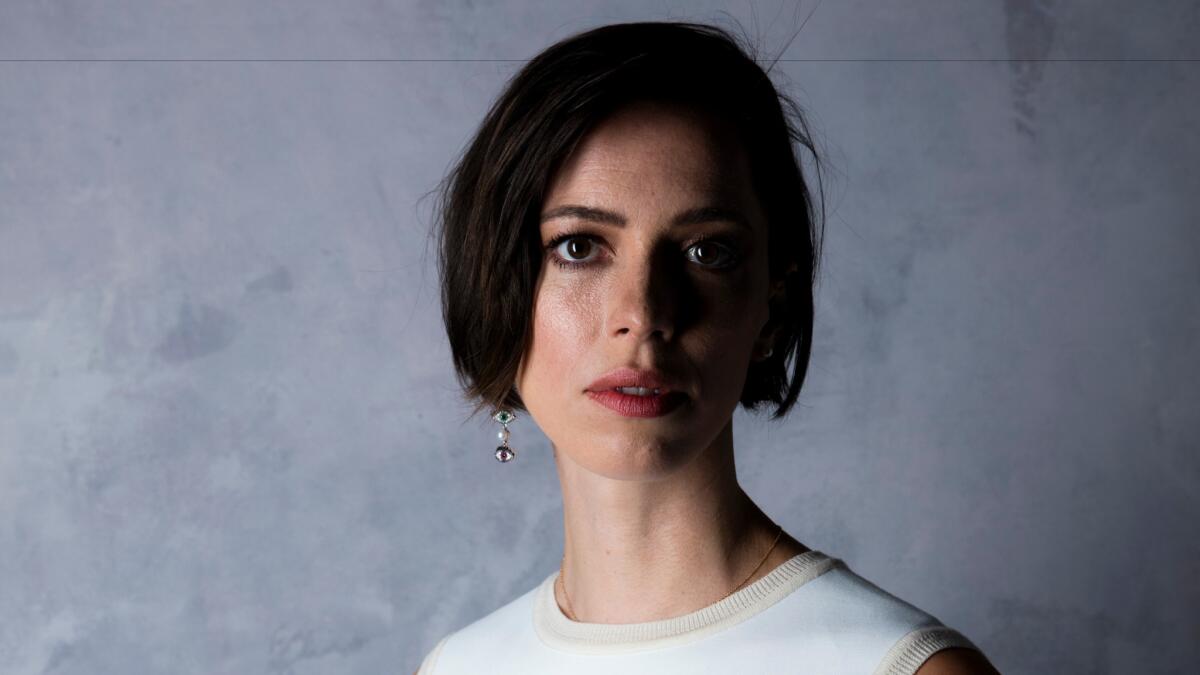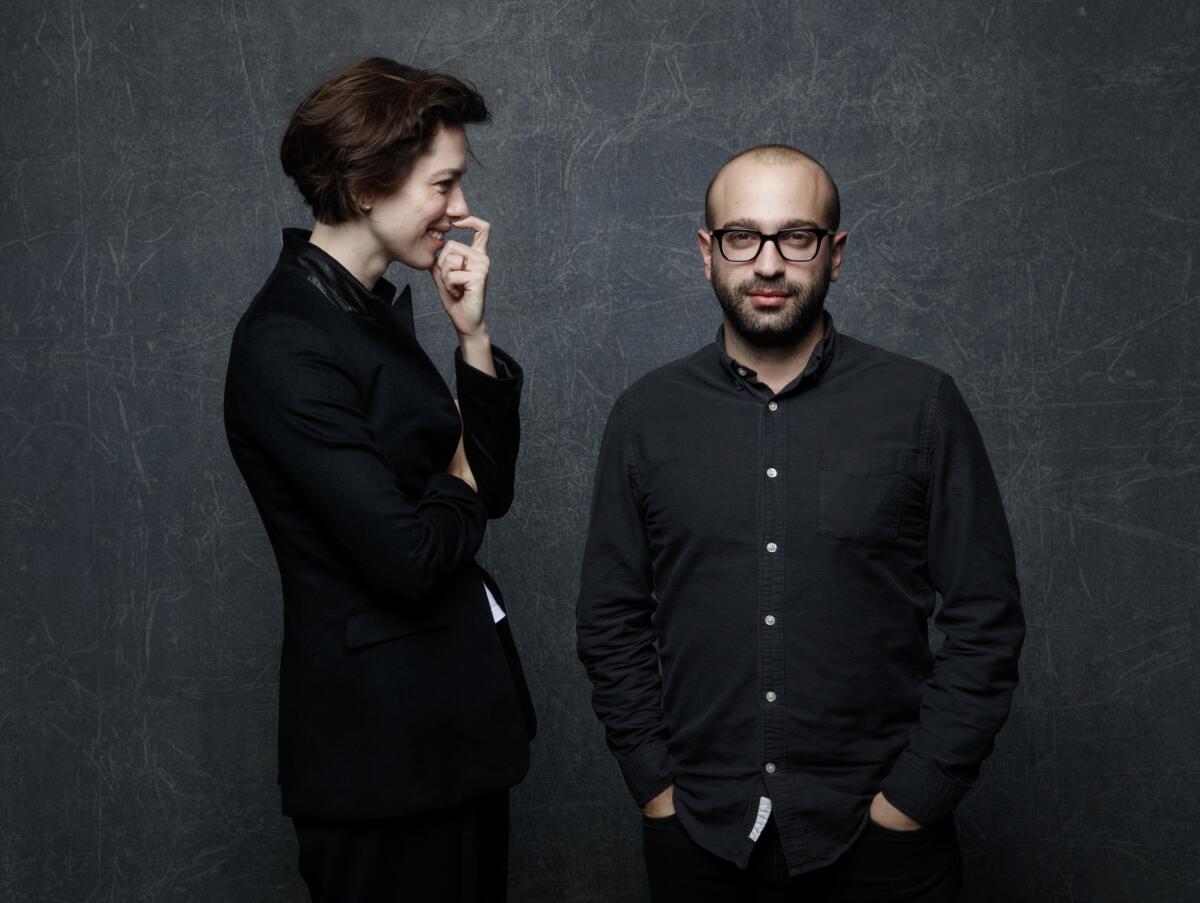Rebecca Hall and the makers of ‘Christine’ explore a real-life tragedy

No one will ever know what drove Florida newscaster Christine Chubbuck to shoot herself in the head on live television in July 1974. Whether fueled by mental illness, anguish over personal issues, anger over professional setbacks or as a form of radical media critique, Chubbuck’s action has the feeling of a statement, even as her meaning remains opaque.
“Christine,” now playing in Los Angeles, creates a portrait of Chubbuck that attempts to both unravel and respect the mysteries of her life and death, drawing a sharp portrait of 1970s workplace culture, the tension between ambitions and abilities and her personal specifics. Directed by Antonio Campos from a screenplay by Craig Shilowich and featuring Rebecca Hall in the lead role, the film manages a tricky push-pull of giving viewers insight into the ways Chubbuck grew increasingly troubled, a cauldron with a tight lid finally boiling over, without providing overly pat explanations.
For the record:
1:44 p.m. Nov. 7, 2024An earlier version of this post referred to actress J. Smith-Cameron as J. Cameron Smith.
“Everything I want to know about Christine Chubbuck, the real Christine Chubbuck, goes to the grave with her,” said Hall, who lives in New York City, during a recent interview in Los Angeles. “When someone is going through whatever she was going through, there is no accounting for how much she internalized and how much she showed the world.
“I don’t feel like I know the real Christine Chubbuck,” said Hall. “I feel like I know the one that I created very well.”
Portraying Chubbuck on-screen has brought Hall — the 34-year-old British-born actress with an impressive resume that includes “Vicky Cristina Barcelona,” “Frost/Nixon,” “The Town” and “Iron Man 3” — arguably the best reviews of her career. The Times’ Justin Chang described Hall as “brilliant” and New York Times critic Manohla Dargis called the performance “humanizing” while noting how the actress “builds her slow-burning performance with both subtly fluctuating expressive details and larger physical gestures.”
By a coincidence of chance, fate or something in the cultural ether, when “Christine” premiered earlier this year at Sundance, also at the festival was Robert Greene’s documentary “Kate Plays Christine,” featuring actress Kate Lyn Sheil in an investigation of Chubbuck and the difficulties of depicting her story.
What both films underscore is that for all the hard work of understanding the details of Chubbuck’s personal and professional life, as well as the contextual specifics of her time and place, she remains unknowable.
“There is a mystery to her that I felt like we had to maintain. I wanted to be able to be in her head and then be out of her head,” said Campos in a recent interview. “It was important you have the difference between the way she felt and the way that she appeared to other people.”

Justin Chang reviews the new drama “Christine,” directed by Antonio Campos and starring Rebecca Hall and Michael C. Hall. Video by Jason H. Neubert.
In an era before widespread home video, the live event of Chubbuck’s on-air shooting – she died hours later – is believed to have been seen by perhaps a few hundred people. (A tape of the event is now known to exist, but is not in public circulation.) An August 1974 article in the Washington Post by Sally Quinn was long the best record of Chubbuck’s life and death.
The origins of “Christine” began when screenwriter Shilowich was admittedly just wasting time on the Internet while working on something else. It was there he came across the barest details of Chubbuck’s story on a morbid list of shocking deaths. Yet something about her story pulled him in. Having gone through his own personal issues with depression, he felt an emotional connection to Chubbuck that grounded the story as it took on additional layers.
“I related to where she was, and how she was wrestling with herself,” Shilowich said. “Being a woman, being a woman in the ’70s, being a newscaster, figuring out how to reconcile all that with my own personal experience was tricky, but just being in touch with her not knowing how to relate that to other people and wanting so desperately to have people help you and then not letting them in when they reach out, that was very familiar to me.”
Campos’ previous features, “Afterschool” and “Simon Killer,” were both chilly portraits of wounded masculinity. When Hall was first sent the script to “Christine,” she was skeptical of the project, concerned that a male writer and male director were making this movie very much rooted in a woman’s experience.
“There are many ways to tell this story, this is the version that I think is a film about sensationalism that isn’t sensationalistic,” said Hall. “When I read the script I was struck by what was an important feminist critique in it apart from anything else. So I was like, why is this being made by two men?
“There are ways in which she is this harbinger; her story is fascinating on so many levels because it doesn’t elicit a simple response,” added Hall. “You go out wanting to talk about all sorts of things that we’re not very good at talking about: suicide, mental health, how we view women in positions of power and authority, how we expect women to act feminine.”

The film features strong supporting performances from Tracy Letts as Chubbuck’s boss, J. Smith-Cameron as her mother and Maria Dizzia, Timothy Simons and Michael C. Hall as co-workers. Hall’s husband, actor Morgan Spector, also appears briefly as a doctor.
“Nobody in the movie knows what’s wrong with Christine. Nobody knows really what is going on with her,” said Letts of playing opposite Hall in the film. “You’re just not aware of who this person is that you’re dealing with. And so for the rest of us the challenge in some ways was to overlook just how screwed up this person is that you’re playing the scene with. And the truth is we do it in our lives every day.”
Hall’s last day with the production on-set was her last scene in the movie, Chubbuck’s shooting. Within a few days she was working on a very different movie – Steven Spielberg’s family-friendly “The BFG” – and the abruptness of the transition forced her to quickly leave the character of Chubbuck behind.
But there was something else, as performing Chubbuck’s very public last act became a kind of exorcism, or at least a point of finality, but also highlighted the fragility and empathy that Hall felt toward the character and the real person she was portraying. Having gone deep inside to create the character, Hall found herself unexpectedly stepping outside herself.
“I suddenly was aware of Rebecca looking at it and going, ‘Don’t do it,’ ” Hall said. “I knew that the film was working because everyone was feeling that, there was a weird sort of somber silence on the set. Everyone had been living with her and we all knew we had come to the day when we were going to have to kill her. And nobody wanted to, myself included. You have a moment where you go, please don’t do it.”
SIGN UP for the free Indie Focus movies newsletter »
Follow on Twitter: @IndieFocus
ALSO
Why documentarian Robert Greene was drawn to the real-life story about a Florida newscaster who killed herself on the air
Park Chan-wook returns with ‘The Handmaiden,’ an erotic romance, con-artist story and period piece
‘American Honey’ weaves an ode to the road with Shia LeBeouf, Riley Keough and Sasha Lane
More to Read
Only good movies
Get the Indie Focus newsletter, Mark Olsen's weekly guide to the world of cinema.
You may occasionally receive promotional content from the Los Angeles Times.











